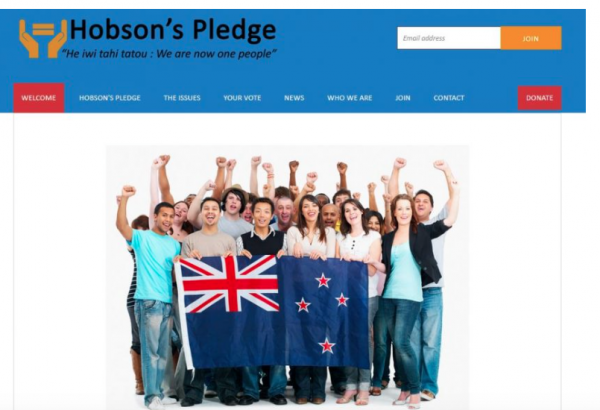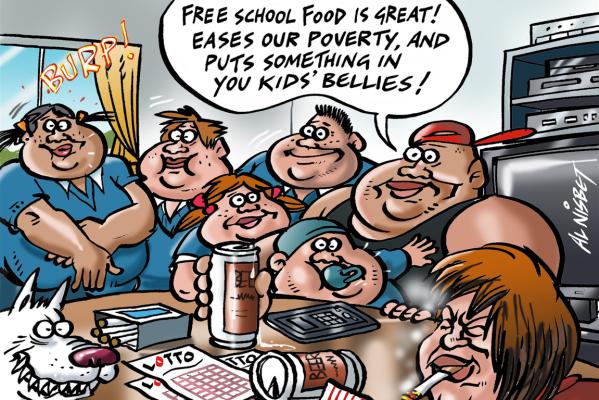
Everyone has clambered on board Donald Brash’s latest racist hate fest and given it the righteous mocking it deserves.
That’s nice.
But where was everyone last week when evidence emerged that the justice system of NZ is racist?
Where were those smug and mocking comments then?
They were all busy focused on the unReal Housewives of Auckland.
Yes we should mock Donald Brash (I think we should all agree to call Don Brash Donald Brash from now on because this arsehole is more Trump than Hobson) but what exactly is the media doing to genuinely challenge the very racism that Donald Brash ferments?
Public access to official information has declined, government control over information flow has increased, public relations and communication management swamps inquiring journalism. Across financially weakening news organisations infotainment colonises news content, weak legal infrastructures compromise freedom of expression just as executive state agencies frustrate and intimidate investigative journalists.
These criticisms are well documented.
We discover that the progressive intentions of the 1982 Official Information Act (OIA) have been subverted by the obstructions of government ministries and senior service officials. Obviously, Robert Muldoon as Prime Minister and Minister of Finance could frustrate individual OIA requests within the letter of the law. Ellis argues that today this subversion is institutionalised. When government ministries assess OIA requests the caveats of national security, public safety and maintenance of the law are supplemented, quite routinely, by political risk assessments. Will this release of official information reflect badly on the government? Cause the Minister embarrassment? Or provide ammunition for opposition parties? Within each department the Minister can intervene personally under the guise of presenting an opinion. Information requests often elicit written official replies which are bland, hard to follow and/or slow to arrive.
Furthermore commercial as well as bureaucratic filters prevail; Treasury and the Reserve Bank typically charge for access to released documents. Meanwhile public scrutiny of government ministries, state owned enterprises and local government authorities is curtailed as news coverage diminishes.
Census figures reveal that the number of print, radio and television journalists fell from 2,214 to 1,170 between 2006 and 2013. Ellis notes that remaining journalists must respond to print, broadcasting and digital platforms as news budgets contract. Unsurprisingly, tabloid news values have predominated. Ellis` front page,weekday survey of five metropolitan dailies (during January 2014) showed that 60 per cent of the New Zealand Herald`s lead stories were about crime or emergencies. The figures for the Dominion Post, the Waikato Times and Otago Daily Times were 52,56 and 40 per cent respectively. Christchurch`s Press devoted 35 per cent of the front page to such content (understandably, earthquake recovery stories were prominent).
According to a 2015 survey of 1900 television news bulletins undertaken by on-line news service Newsroom Plus, 24 per cent of TV One stories were devoted to crime and punishment;the figure for TV 3 was 32 per cent. (see civicsandmediaprojectnz.org). Ellis asks whether non crime-related news events of relevance to New Zealanders were adequately covered. He generally concludes that `society is struggling to maintain the distribution of democratically significant information and meaningful debate to large scale audiences` (p22).
…so mock Donald Brash and make jokes, but let’s not think that the very mainstream media voices denigrating Donald Brash do anything other than reinforce the very racism and anti-Maori stereotypes that Donald and his rich white mates feed upon.
The same media organisation that published this cartoon…

…thinks it can criticise Donald Brash. Right.
The mere idea that Maori somehow have a special privilege is just a white myth! Look at the incarceration rates, look at the crime rates, look at the life expectancy rates, look at the socio-economic rates, look at the education rates, health rates, inequality rates, poverty rates – in EVERY SINGLE NEGATIVE SOCIAL INDICATOR, Maori are suffering.
It’s not enough to joke about Donald Brash, it requires a never ending fight against the mainstream media who profit from those broken stereotypes.





You make some good points.
I published this item this morning:
https://willnewzealandberight.com/2016/10/01/maori-becoming-disenfranchised-with-the-establishment/
I guess white privilege explains why Maori have the highest infanticide rates in the world, as well as hospital admission rates for non-accidental injury of children and infants.
I guess white privilege also explains why Maori have the highest rates in the country for accidental death (vehicular and non-vehicular).
Your narrative is racist in its implicit assumption that Maori value (i.e. are prepared to make an investment of personal effort for) the health, educational and career goals of non-Maori. Nisbet’s cartoon is offensive, but at least it alerts us that there is an element of choice in life’s outcomes.
It’s racist to impose on a people Foriegn political and economic power that causes state violence/disease/death and then deny those people basic health care and legal aid.
his name is donald t. brash…
Donald Trash is an appropriate name, and a good example of the trash that is the media in this country is this evening’s news on channel One; ten minutes in and already a sports story, and apparently the opening of a clothes store is of significance for nationwide televised news.
What disgusted me at the time was that Race Relations Commissioner Dame Susan Devoy said those cartoons. (there were more than 1), were NOT racist…. well they bloody well were and still are imo.
Donald Brash – very good
Thank you Mr Bradbury for your insight. So refreshing.
Sorry Martin you are not seeing the complete picture , yes there are these social problems with some homes etc. But my point is its not just those whom have Maori DNA homes. The crimes committed etc are not just those with Maori DNA. Isnt it time we stopped this BS of putting Kiwis into White Maori categorys’.
I am a New Zealander or Kiwi, my family have been part of this country since the 19th century. I am not a European as I have never been there, my DNA may come from this area but my roots are in this country. I personally find the label by some in our community of Pakeha as insulting. I am a Kiwi who is well aware of the problems of underfunded health system etc etc. But I don’t see this as a one sections of society issue, its an issue that affects many many “Kiwis’ regardless in 2016 of where there DNA originated or their ancestry all over this country.
I am not a fan of Don Brash’s ACT politics as mine personally are more closer to your own. But on TV3the Nation last Saturday he made some valid points on racism which is in this country. To make political appointments with equal voting rights to elected member on to Governing institutions based on their ancestry or DNA they carry is “RACIST.” and I say this regardless of who was here first etc that to me is irrelevant ( re we complained about South Africa apartheid system are we not doing the same) as Hobson said with the treaty we are now ONE people. In a true democracy in 2016 there should only be elected members on a governing board with no political appointments made because of perceived rights of ethnicity.
I see the special Maori MPs in Parliament as racist, why stop with Maori why not have pacific Islands etc etc representations in Parliament to be fair etc I see Brash’s comments that the crime etc problems we have are social problems to be solved by society themselves.
How the later can be solved well that’s a big topic to be discussed widely BUT is not to me helpful making it a Maori vs White person discussion as there I suspect are many reasons why etc. Why I ask is the person in these problems ethnicity or DNA even part of the picture. Shouldn’t it be the individual to be judged etc as a individual not if he/she is a Maori or white etc Also I ponder the thought as why was there not the same crime etc rate in the bad old social days of the 1950s-1980s ? You know the time in NZ when we had actual discipline in our schools and parents gave children a smack for bad behavior ??
Comments are closed.